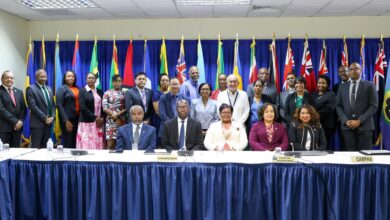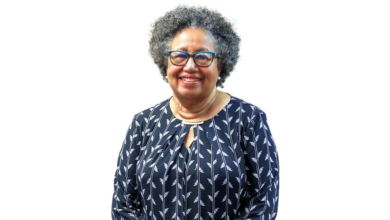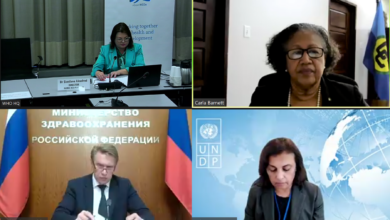(CARICOM Secretariat, Turkeyen, Greater Georgetown, Guyana) The Pan American Health Organization (PAHO) says it will continue its partnership with the Caribbean Community (CARICOM) in fighting Chronic Non-Communicable Diseases (NCDs) that are wreaking havoc on the economies of the regions of the Americas.
Chronic NCDs, including heart disease and stroke, diabetes, cancer and chronic lung disease account for more than 70% of deaths globally and is the number one killer in the Americas, which include the Caribbean region.
At a meeting on Thursday at the CARICOM Secretariat, Dr Ernest Pate, PAHO / WHO Caribbean Programme Coordinator and his high-level team of Drs James Hospedales, PAHO / WHO Regional Adviser, Prevention and Control of Chronic Diseases and Karen Sealy, World Health Organisation Special Adviser briefed the CARICOM Secretary-General Irwin LaRocque and his team of senior officials on the progress that has been made in the region in stemming the tide of Chronic NCDs.
In his presentation, Dr Pate highlighted the work of PAHO, especially in the area of technical cooperation. He pointed to the long history of close collaboration with CARICOM in its health program, noting that the Caribbean Cooperation in Health (CCH) was developed with strong leadership from CARICOM and technical support from PAHO. He also underlined the goals of the CCH and emphasized the role PAHO had played in advancing those goals.
Notwithstanding the many strides made in regional public health, Dr Pate was of the opinion that public health leadership in the Caribbean had somewhat weakened and expressed hope that CARICOM and PAHO would work together to strengthen this. He was also confident that the CARICOM Secretariat would place high priority on NCDs and integrate this issue in all of its programs, since it was the one the major threats to public health.
Approximately 250 million people are living with NCDs in the Americas, while in 2009 alone, the deaths caused by NCDs totalled 4.5 million of which 45% were caused by heart diseases and 35%, by cancer. Barbados, Trinidad and Tobago and Jamaica are the top three countries with the highest prevalence of NCDs among adults in the Americas. The World Economic Forum and Harvard Business Review 2011 recorded that in the 20-years, US30-trillion dollars would be spent in the world, annually on NCDs, while US500 billion would be spent annually, by low middle income countries such as those in the Caribbean.
Dr Hospedales who provided this data said that the situation was not sustainable, but stressed that there were cost-effective solutions that could be adopted. Those, he stated, included healthy public policies and healthy policy interventions as well as comprehensive programs of prevention and control.
He referred to the 15-point 2007 Port-of-Spain Declaration, Uniting to the stop Chronic Non-Communicable Diseases, issued by CARICOM Heads of Government, and which has become the benchmark for measuring the progress of actions taken by Member States against NCDS. Dr Hospedales enumerated achievements in areas of surveillance, treatment, physical activity, tobacco prevention and education and promotion, but hastened to imply that the Region could not rest on its laurels since there was still much more work to be done, especially in the areas of mandatory physical activity in schools; compliance with aspects of the Framework Convention on Tobacco Control (FCTC) and nutrition.
His colleague, Dr Karen Sealy was optimistic and asserted that the Region had much to celebrate even in the face of the challenges. She singled out the increased awareness of NCDs as a development issue and the changed perception that there were no cost-effective measures of one of the successes of the PAHO / CARICOM partnership. Dr Sealy also noted that the achieved political declaration and commitment for coordinated, multi-sectoral, national, regional and global programs was cause for celebration and added that the fact that NCDs remained on the global agenda was even further cause. While we have not fully achieved international solidarity for policies in support of national plans including for universal access to services, medicines and technologies, we have made giant steps in this direction, Dr Sealy argued.
For his part, Secretary-General LaRocque recorded the Community’s appreciation for the mammoth support given by PAHO to the Region and in particular for helping to plant the issue of NCDs on the global agenda. He reiterated the Community’s commitment to providing continued global leadership for NCDs and gave his word that the partnership with PAHO would be strengthened, especially in areas of political leadership; Community-wide monitoring of and reporting on NCDs; use of social and other media to promote healthy lifestyles; inclusion of NCD issue in bilateral and international fora; indigenous documentation of the Global Health Diplomacy process and facilitating dialogues non-health sectors at the ministerial level.





